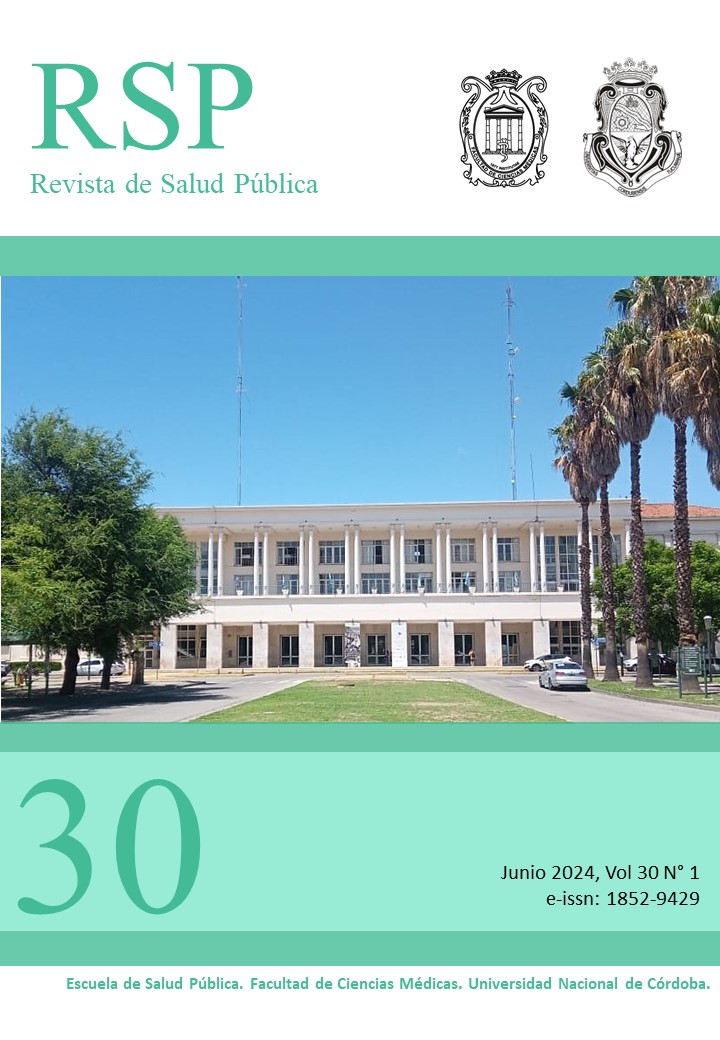Attachment Styles and Psychosocial Risk of Empathy Burnout in Psychologists and Psychiatrists
DOI:
https://doi.org/10.31052/1853.1180.v30.n1.43460Keywords:
Attachment, Empathy, RiskAbstract
The impact of mental health professionals' attachment styles on their own psychosocial vulnerability has not been extensively explored in the literature. Therefore, the aim of this research is to analyze possible connections between three adult attachment styles (secure, anxious, and avoidant) and empathy burnout syndrome (EBS), which is understood as a psychosocial risk among mental health professionals. Data were collected using validated scales from a sample of 324 psychologists and psychiatrists from Santa Fe. Correlational analyses indicate significant links between EBS, secure attachment and anxious attachment. Multiple linear regression analyses show that both explain 16% and 11% respectively of the variance in empathy burnout. Findings point out secure attachment as a protective factor against empathy burnout and highlight the psychosocial risk associated with anxious attachment in psychologists and psychiatrists.
Downloads
References
Degnan A, Seymour-Hyde A, Harris A, Berry K. The role of therapist attachment in alliance and outcome: A systematic literature review. Clin Psychol Psychother. 2016; 23:47-65. doi:10.1002/cpp.1937
Aguilar Sandí, M. Intervenciones psicoterapéuticas basadas en la teoría del apego. Revista Cúpula. 2019; 33: 33-53. https://www.binasss.sa.cr/bibliotecas/bhp/cupula/v33n1/art03.pdf
Rizou E, Giannouli V. An exploration of the experience of trainee integrative psychotherapists on therapeutic alliance in the light of their attachment style. Health Psychol. Res. 2020; 8:9177. doi:10.4081/hpr.2020.9177
Barnett MD, Hays KN, Cantu C. Compassion fatigue, emotional labor, and emotional display among hospice nurses. Death Stud. 2022; 46:290-296. doi:10.1080/07481187.2019.1699201
Guillén Puerto A, López Rodríguez A, Motta Tautiva P, Ortiz Hernández Y. Prevención del desgaste por empatía y promoción de la salud mental en personal sanitario Bogotá: Corporación Universitaria Minuto de Dios UNIMINUTO; 2022. 40 p.
Zamponi J, Rondón J, Viñuela A. Primer cuestionario validado para evaluar síndrome de desgaste por empatía. VI Jornadas Universitarias y III Congreso Latinoamericano de Psicología del Trabajo. Buenos Aires; 3-5 octubre. Buenos Aires: Facultad de Psicología; 2009.
Brugnera A, Zarbo C, Scalabrini A, Compare A, Mucci C, Carrara S. Attachment anxiety, reflective functioning and well-being as predictors of burn-out and psychological distress among psychotherapists: A longitudinal study. Cli Psycol Psychoter. 2023; 30: 587-598. doi.org/10.1002/cpp.2823
Silva RG, Figueiredo-Braga M. The roles of empathy, attachment style, and burnout in pharmacy students' academic satisfaction. Am J Pharm Educ. 2019; 83:6706. doi:10.5688/ajpe6706
Fuchshuber J, Hiebler-Ragger M, Kresse A, Kapfhammer H, Unterrainer H. The influence of attachment styles and personality organization on emotional functioning after childhood trauma. Front. Psychiatry. 2019; 10:643. doi: 10.3389/fpsyt.2019.00643
Ortiz-Granja D, Acosta-Rodas P, Lepe-Martínez N, Del Valle M, Ramo V, Bolaños Pasquel M, et al. Development and validation of a brief scale to assess attachment in adults: psychometric analysis in Latin America. Rev. Ecua. Neuro. 2019; 20: 35-46. doi.org/10.46997/revecuatneurol29100035
West A. Associations among attachment style, burnout, and compassion fatigue in health and human service workers: A systematic review. J Hum Behav Soc Environ. 2015; 25: 571-590. doi: 10.1080/10911359.2014.988321
Pardess E, Mikulincer M, Dekel R, Shaver P. Dispositional attachment orientations, contextual variations in attachment security, and compassion fatigue among volunteers working with traumatized individuals. J Pers. 2014; 82: 355-366. doi: 10.1111/jopy.12060.
Poore M. An investigation of attachment orientation, compassion fatigue, compassion satisfaction and resilience in hospice and palliative care nursing staff. (Doctoral Thesis). Southampton: University of Southampton; 2016.
Ortiz-Granja D, Acosta-Rodas P, Rubio D, Lepe-Martínez N, Del Valle M, Cadena D, et al. Consideraciones teóricas acerca del apego en adultos. Avances en Psicología. 2019; 27: 135-152. doi.org/10.33539/avpsicol.2019.v27n2.1793
Salessi S, Suárez Losavio J, Clemente MB. Síndrome de desgaste por empatía y estilos de apego en profesionales de la salud mental. XIII Congreso Internacional de Investigación y Práctica Profesional en Psicología. Buenos Aires; 24-26 noviembre. Buenos Aires: Facultad de Psicología; 2021.
Published
How to Cite
Issue
Section
License
Copyright (c) 2024 Escuela de Salud Pública y Ambiente. Facultad de Ciencias Médicas. Universidad Nacional de Córdoba

This work is licensed under a Creative Commons Attribution-NonCommercial 4.0 International License.
Authors who publish with this journal agree to the following terms:
- Authors retain copyright and grant the journal right of first publication with the work simultaneously licensed under a Creative Commons Attribution License which allows the work to be copied, distributed, exhibited and interpreted as long as it is not done for commercial purposes.
- Authors are able to enter into separate, additional contractual arrangements for the non-exclusive distribution of the journal's published version of the work (e.g., post it to an institutional repository or publish it in a book), with an acknowledgement of its initial publication in this journal.
- Authors are permitted and encouraged to post their work online (e.g., in institutional repositories or on their website) after the publication process. (See The Effect of Open Access). (See The Effect of Open Access).



